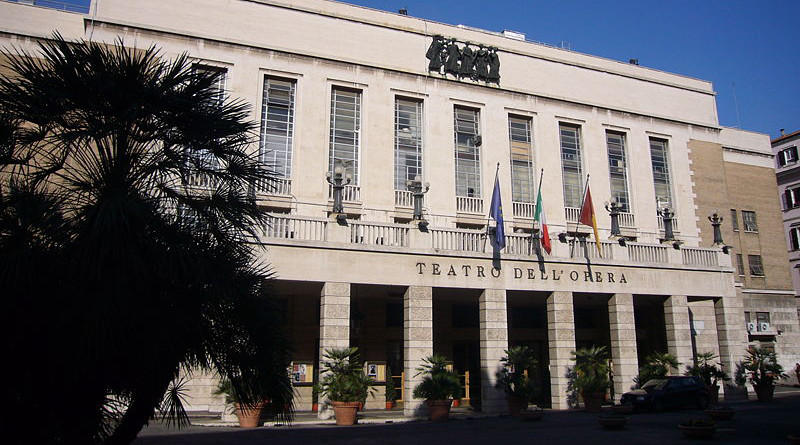Eugene Onegin, Opera By Tchaikovsky, In Teatro Dell’Opera Di Roma – Review
Love and passion that is now unattainable are at the center of Tchaikovsky’s tormented Eugene Onegin, a work taken from the homonymous verse by Pushkin brought to the stage in the wonderful installation by Robert Carsen created in 1997 for Met New York. It was for the first time at the Teatro dell’Opera in Rome. It was great success by critics and audiences for the magnificent Russian opera directed by James Conlon in an installation that still looks modern and overwhelming 20 years after its first debut.
A setting that bears the unmistakable signature of Robert Carsen and his minimalism and which in its austerity is ready to enhance the purity of the feelings that remain the heart of the work. It was the work already defined as “encyclopedia of Russian life”, the Onegin is structured by Tchaikovsky as “lyrical paintings in three acts”.
Robert Carsen captures the composer’s indications by constructing a show with a nostalgic charm that stages nineteenth-century Russia, its country life, dancing in the buildings and the ritual of duels , the sumptuousness of the aristocracy. At the center of his direction, never static, but men and women, their feelings that continue to make them individuals still modern, almost eternal. The feelings are feelings and the unrequited love story of the pure and simple Tatjana for the tormented womanizer Onegin continues to engage the viewer.
At the center of the novel and the work passions and feelings unfulfilled in tangle of love and death. The poet Lenskij loves the fickle Olga, but the young man will die in a duel at the hands of his best friend Onegin, the same man who refused the love of pure Tatjana ready to flee him when he, years later, discovers love for the woman now married to an aristocratic nobleman.
The charm of this setting also lies in the precious balance that exists between the dryness of the scenes played on the colors, the beauty of the period costumes between large skirts and elegant velvets that bring us to imperial Russia with the overwhelming feelings that run through the whole Opera.
The minimalism of the always essential scenes of Michael Levine who is the creator of the beautiful period costumes with few, indispensable objects, accentuates all the emotional richness of the characters. It helps to build the poignant atmosphere of a show that continues to be emotionally next to the spectator. The lights of Jean Kalman that illuminate the scenes and the lives of the characters through three colors ranging from the warm Russian autumn between yellow and orange symbol of the hope of happiness. A passion that has just blossomed up to the cold blue, symbol of the loving refusal that also accompanies the chilling duel of Onegin and Lenskij with a brilliant gimmick by Carsen that puts the two men frontally to the spectator with an unprecedented point of view up to the dressing of Onegin. That is the moment of connection between the second and third act which replaces the original dances. To get to the third act dance where few chairs help to imagine the richness of a noble palace in the nineteenth century Petersburg and the chilling dialogue between the two missed lovers wrapped in a cold white.
Brilliant single cast with the always convincing tenor Markus Werba with a pleasant and elegant timbre, also suitable in his physical prowess in the role of the contemptuous and haughty Onegin. That is a character crossed by a subtle melancholy and almost unjustified suffering. A great protagonist is the young Maria Bayankina, a beautiful voice debuting at Costanzi in the demanding role of the sweet Tatjana, bright and moving in her evolution as a woman.
Also on stage are Yulia Matochkina in the role of the frivolous Olga, Saimir Pirgu in the role of the lens Lenskij, John Relyea, the austere Prince Gremin. The tormented Russian characters scene live through immediately recognizable silhouettes and through a melodrama of the soul overwhelmed by the harmonies of Tchaikovsky that recover themes related to the great symphonies or the great ballets of the classical tradition enhanced by a dramatic and enveloping direction. The beauty of a setting so timeless, but so extraordinary to enhance the drama of feelings, leaving the viewer to question the Tatiana’s immediate passion for Onegin. It is about the dynamics of the inherent suffering of a tormented character behind which an equally tormented Tchaikovsky hides with all the demons of his homosexuality.
On 21- February 2020 Friday evening, in Opera dell’ Roma, we watched Peter Ilyich Tchaikovsky’s “Eugene Onegin” opera on the first balcony. We got our seats at 19:00. The main gates opened at 19:00, we walked in, guided by ushers with black suits directed us to our seats. Audience was dressed very seriously. Politicians, bureaucrats, business people of Rome society were in the Opera. The orchestra was very big, the acoustics of the place were great. We do not know how we spent 3-hours there.
During intermission, we entered into the foyer, a high ceiling big space. The opera shop was open for sale, they were selling everything which may come to mind about the opera. There were CDs, DVDs, books, souvenirs, whatever you were looking for.
On the Opera Roma stage, Italian artists taught us art of opera. On the big stage, the ritual of entrance to the hall and the balcony was very different, with empty décor, wonderful costumes, wonderful staff, wonderful acoustics, chorus elements playing in a separate roles. The opera was over, there was almost no grand parking lot nearby, since opera house was built 200 years ago in 1888, all the business men wearing black suits, lovely ladies and we all went to the Republic Metro station, and we were scattered to our houses by the Metro after 23:00.

